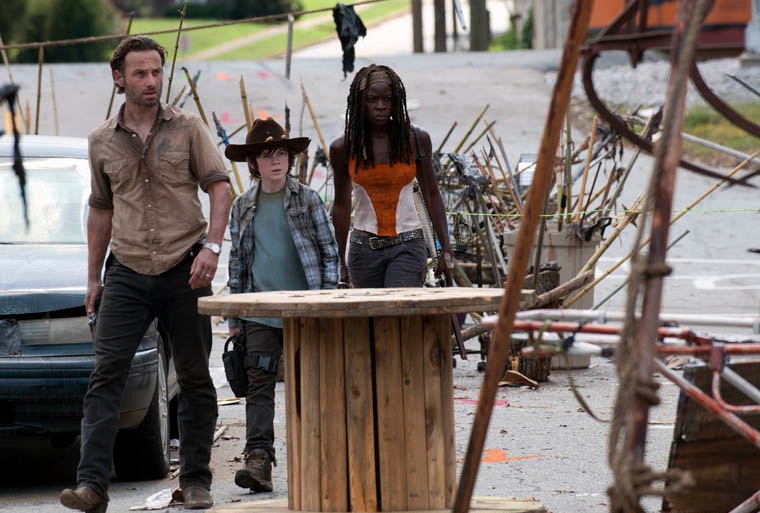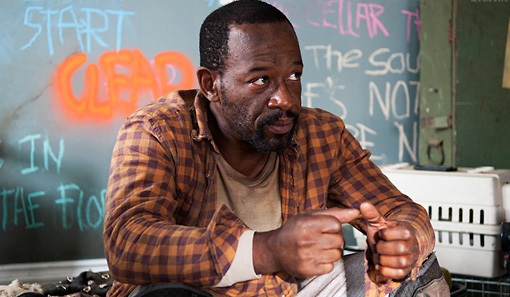You could spend hours thinking about how certain choices and circumstances affect your life, from small things like taking a different route home to big decisions like moving across the country. In this episode, one of the best in the series, Rick, through an unexpected blast from the past, gets a glimpse of what his life might have been had he never found Lori, Carl, or his group.
We find our intrepid trio, Rick, Carl, and Michonne, on a hunt for supplies in King County. Visiting home always fills me with mixed emotions so I can only imagine what was running through Rick’s and Carl’s minds as they saw what remained of their old neighborhood. Having someone shoot at them from a nearby rooftop probably didn’t help foster a welcoming environment. At first, I felt annoyed that this random person was forcing them to use precious ammo that could be used to fight the Governor, but color me shocked when the shooter is uncovered, and it turns out to be… some guy I’ve definitely seen before. Okay, I’m officially a terrible fan, but I blanked on his name completely. In my defense, the last time Morgan (thank you, Wikipedia!) made an appearance was during the first episode when Rick gave him a walkie talkie and sent him on his way with his son, Duane. Like most fans, I had always hoped for an update on his whereabouts, and with major props to the writers, this encounter felt organic and timely, especially given Rick’s attempts to grapple with his worsening state of mind.

Although Rick losing his wife is nothing to scoff at, Morgan’s story is nothing short of tragic. In the year since Rick last saw Morgan, he lost his son because of his failure to shoot his walker wife, Jenny. In a form of atonement for his selfish weaknesses, he “clears” his surroundings of walkers, living alone in a shelter filled with trip wires, suspended axes, and caged rats and birds to lure any walkers that may wander through. It’s very much like Home Alone: Zombie Edition. After Rick subdues Morgan when he comes at him with a knife taped to his cot, it takes a few beats for him to accept that Rick isn’t just wearing a dead man’s face. But once his brain finally registers what his eyes see, he spews resentment at Rick for never answering his walkie talkie, tearfully recounting numerous mornings spent on the roof listening to nothing but static. Yet it’s hard to find fault in Rick – he had other things to worry about and a group of people to protect as they got pushed further out into the country.
The chalk writings on the wall are a stark visual of Morgan’s anguish and deteriorating mental state. He has nothing left but his thoughts and has become a literal representation of the “walking dead.” With no real purpose in living without his wife and son, it’s unsurprising that he begs Rick to kill him several times. The scenes between Rick and Morgan are very powerful because it’s easy to imagine Rick going down a similarly dark path if he were to lose Carl, too, although I see him going out guns blazing as opposed to holding down a booby trapped fort. In a way, everything Rick says to Morgan applies to his own situation. It’s as if he’s trying to convince himself that he can heal, and even though he’s not seeing things rightly, he can come back from this momentary lapse. He still has Judith, Carl, and his pseudo-family to live for, and hopefully his time spent with Morgan finally allows him to be the leader that everyone needs, especially with the looming clash with the Governor.

While Rick deals with Morgan, Carl and Michonne set off on a hunt for a crib. However, Carl has another agenda and makes a detour to the local café. Despite having to grow up way too quickly, there are moments when Carl still acts like a stubborn child, such as lying about going to the baby store and disobeying Rick’s order to go back to the car when they’re under attack. His small acts of disobedience are a continued exploration of his changing relationship with Rick. Any normal father would want to protect their son, but even though he has shot many a walker, Carl doesn’t hesitate to shoot Morgan as he runs down the sidewalk. It’s heartbreaking to hear Rick say, “I didn’t want you to have to do that.” “I had to,” replies Carl, and it’s becoming clear that Rick needs to start treating Carl like someone capable of protecting himself and the group. And although his innocence can’t ever be restored, it’s sweet, albeit completely reckless, that he thought to get the photograph of his family from the café so Judith can see what her mother looks like when she gets older. It’s just another example of Carl toeing the line between the innocence of the past and the harshness of life in the present. He also apologizes to Morgan for shooting him earlier, but Morgan counters by saying, “Don’t ever be sorry.” That’s a loaded statement open to many interpretations, but it feels appropriate for a young boy who was forced to shoot his turned mother, especially since Carl did what Morgan couldn’t do to Jenny.
This episode also felt like a huge breakthrough for Michonne. She finally showed a softer side to her personality, whether it was scarfing down Morgan’s food (the mat said welcome!) or taking an atrocious cat figurine from the café. She has a sense of humor! But awful interior decorating tastes aside, I loved that she finally opened up to Rick and Carl. Frankly, her sudden openness scared me because nothing good ever happens when feelings are expressed (see: Axel just before he was shot in the head), but seeing this side of her convinces me that she still has a heart underneath that steely, katana-toting exterior. She always felt like an asset to the group for her intellect and fighting skills, but she finally seems to have convinced Carl, who tells his father that “she might be one of us.” Later, Michonne also mentions to Rick that she understands how he feels because she used to talk to her dead boyfriend. “It happens,” she says with a knowing look. Her admission will go a long way in cementing what I anticipate will be a great partnership between to two very similar people who are broken but learning to deal and heal. If this episode taught Rick anything, hopefully it’s that people can’t survive in solitude, from Morgan to that poor hitchhiker and even Michonne. The sooner he realizes everything he has to live and fight for, the better equipped he’ll be to deal with the Governor.
Notes and Quotes
-- This show is great with the little details. Case in point, seeing the sign of “Erin, we tried for Stone Mountain. – J” followed by a walker with an Erin bracelet on its wrist.
-- Michonne went in and out of the café so quickly to retrieve the photograph (and cat) that I’m convinced the she moonlights as the Flash. But I love how sternly she takes control of the situation and tells Carl to wait outside of the café. “No more bullshit,” she says, and I love her for putting Carl in his place, especially when he stands outside the door like a petulant child. He might be able to shoot walkers without blinking, but he still has many more things left to learn.
-- It’s worth noting that no one in the car blinked as they kept seeing the hitchhiker, both alive and as a puddle of goop on the side of the road. The hitchhiker underscores the apprehension everyone feels in the apocalypse. Who can you trust in a world where everyone is a threat to survival? Could the hitchhiker have done anything differently to get them to stop? I’d venture to say no. I’m sure he was a lovely person, but the risks of taking in a stranger far outweigh the pros.